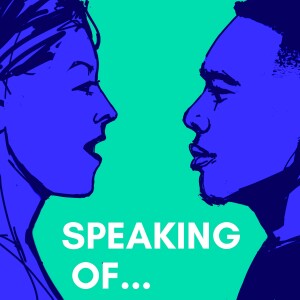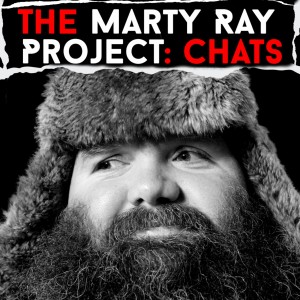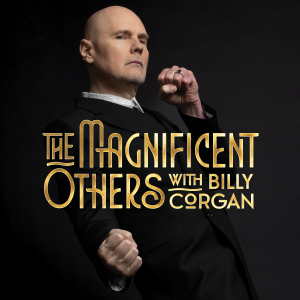

Speaking Of... Conversations on Voice, Speech, and Identity with Ryan O'Shea
https://feeds.buzzsprout.com/307352.rssEpisode List

Why do I feel fine having conversations in meetings, but feel nervous giving presentations? with Cameron Cramer
Today on Speaking Of… I’m joined by my partner, Cameron Cramer.Cameron is a non-performer working in YouTube marketing, and he asked: why do I feel fine having conversations in meetings, but feel really nervous giving presentations? This question is a really common one for people in the professional/corporate world, but it’s also relevant for performers who often feel a shift in their ability to be present in different performance scenarios. Cameron and I talk about how the context we give ourselves around speaking engagements ultimately decides how we respond to those scenarios, and why we must give ourselves a positive context in order to find enjoyment in any speaking scenario. We also discuss some of the public-speaking tips he’d been given over the years and how that “one-size-fits-all” approach has been unhelpful.You can find complete show notes and links to everything we’ve mentioned in the episode on https://www.voiceandspeechwithryan.com/podcast.

How does our posture affect our breath? with Arianne Villareal
Today on Speaking Of… I’m joined by a longtime friend, Arianne Villareal. Arianne is an actress and singer based here in LA, and she asked: how does our posture affect our breath? This question is an incredibly useful one for performers and non-performers alike, and brings up some really interesting follow-up questions and exercises. Arianne and I talk about how our breathing and our emotions are intimately connected and why paying attention to your breath when you’re feeling anxious or unsettled may not always be the right answer. We work through some useful breathing exercises, talk about how her most recent performance affected her breath and body, and how you can anchor yourself physically if you’re feeling off-balance onstage or in everyday life. You can find complete show notes and links to everything we mentioned in the episode at https://www.voiceandspeechwithryan.com/podcast

What makes a voice masculine or feminine? What does it mean to have a “gay” voice? with Kevin Whitmire
On this episode of Speaking Of… I’m chatting with my friend Kevin Whitmire, an actor and teaching artist based in LA. Kevin and I start off by talking about performance and how he changes his voice for each role. We then dive into his question: what makes a voice masculine or feminine? What follows is a fascinating conversation about what constitutes our most “real” voice and how speech and acting coaches can reinforce stereotypes about how certain groups of people do – or should – speak. We also talk about having a “gay” voice, feeling uncomfortable when you hear yourself on a recording, and the vulnerability of speaking aloud.You can find complete show notes and links to everything we mentioned in the episode at https://www.voiceandspeechwithryan.com/podcast

Can the sound of someone's voice tell you whether they're a good or bad person? with Daniel Jaar
For the very first episode of Speaking Of… I’m joined by my friend and singer Daniel Jaar. Daniel and I met in a workshop in LA and he has such incredible presence, I’m delighted he’s the first guest on the show!Daniel brought a really fascinating question with him: Can the sound of someone’s voice tell you whether they’re a good or bad person? We talk about the story that inspired Daniel’s question and then dive into a discussion about what someone’s voice can tell you about their identity (if anything). We touch on code-switching and its impact on both singing and everyday life, why some people might put on a “fake” sounding voice, and whether we can gauge someone’s intentions by the way they sound.You can find complete show notes and links to everything we mentioned in the episode at https://www.voiceandspeechwithryan.com/podcast

How does our ancestors’ experience of their voice affect ours? with Ana Lorena Sánchez
On this episode of Speaking Of… I’m speaking with singer and actor Ana Lorena Sánchez about how she got into acting and her relationship with her voice.Ana wanted to know: How does our ancestors’ experience of their voice affect ours?We then dive into a fascinating conversation about generational trauma and why women are often silenced. We talk about why so many people are disconnected from the power of their voice – which resides in the gut and diaphragm – and the workarounds many people develop to overcome this disconnection.Ana and I also walk through some practical breathing exercises that can make you feel more grounded and connected to your feelings when speaking in public or performing. We wrap up by touching on the practice of structuring your voice and talk about the intimate connection between your body and your speech.And, if you’re in LA in June, come join me for a weekend intensive workshop on the principles of Fitzmaurice Voicework. You can learn more about the workshop and register here!You can find complete show notes and links to everything we mentioned in the episode at https://www.voiceandspeechwithryan.com/podcast
You may also like
Create Your Podcast In Minutes
- Full-featured podcast site
- Unlimited storage and bandwidth
- Comprehensive podcast stats
- Distribute to Apple Podcasts, Spotify, and more
- Make money with your podcast












